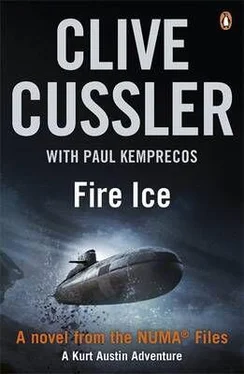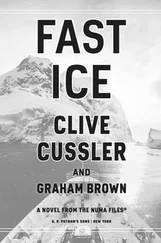The admiral froze, wondering if strings were attached after all. "What's that?"
"Don't forget to use sunscreen when you're out on the water," Petrov said.
The admiral threw his arms around Petrov and embraced him in a bone-cracking bear hug. Then he tossed his cap across the room. His jacket, with medals clattering, followed.
Petrov slipped away. He allowed himself a rare smile as he stepped through the outside door. He shook hands with the doorman, passing along another hundred-dollar bill. He was feeling generous tonight. The doorman shoved his way through the crowd to make a path for Petrov, who quickly limped through the alley and disappeared into the night.
THE BLACK SEA
THE CALL FROM Captain Atwood came in as the NUMA helicopter sped across the Black Sea toward the Turkish mainland. Austin had been jotting down his thoughts in a notebook when he heard the familiar voice crackle in his earphones.
"Kurt, are you there? Come in, please," Captain Atwood urged.
"Miss me already, Captain?" Austin said. "I'm truly touched."
"I'll admit things are a lot quieter here since you left, but that's not why I'm calling. I've tried to get in touch with the Sea Hunter and still can't raise her."
"When was the last time you talked to her?"
"I called last night to say you'd be on your way in the morning. Everything was okay. Then I tried again after you took off, to let them know you were in the air. No answer. We've been calling at regular intervals. I called again a few minutes ago. Still no reply."
“That's odd," Austin said, glancing down at the water-tight bucket sitting on the floor at his feet. Inside the bucket, soaking in seawater, was the silver jewelry box plucked from the Odessa Star. At Gamay's suggestion, the Argo had called the Sea Hunter and asked if a conservator could take a look at the box and its contents. The Sea Hunter's captain said the ship had finished its project in the Black Sea and was on its way to Istanbul, where he would be happy to hook up with Austin.
"It's more than odd; it's crazy. What the hell do you make of it?"
Austin went down a mental checklist of possible reasons for the ship's silence, but none of them held water. All NUMA vessels carried the latest in communications, and their systems were redundant several times over. They kept inconstant contact with other ships.
He felt as if someone were walking on his grave. "I don't know, Captain. Have you called NUMA headquarters to see if anyone there has heard from the ship?"
"Yes. They said the Sea Hunter called in yesterday, saying they had found some significant Bronze Age relics and were heading into port."
"Hold on, Captain," Austin said. He hailed the pilot over the intercom. "How far can we fly on our current fuel supply?"
"We're corning up on the Turkish mainland now. We're carrying a light load, so we can go another forty-five minutes or so before we drop out of the sky. Planning a side trip?"
"Maybe." Austin looked over at Rudi Gunn, who had been listening to the exchange with Captain Atwood. Gunn nodded slightly, like someone bidding at an auction. Do what has to be done. Austin got back to Captain Atwood and said they would try to find the Sea Hunter. Then he relayed the ship's last known position to the pilot. The chopper banked and headed off at a tangent.
Zavala sat up and his eyes snapped open. He had been plugged into a Walkman, completely absorbed in a Latin American CD. Zavala was an experienced pilot who flew by the seat of his pants like an old barnstormer. Sensing the course change, he removed his earphones and peered out the window, a quizzical expression on his face.
"We're making a detour," Austin said, explaining the situation. Then he called the Argo and asked the captain to advise the Trouts of the change in plan. Paul and Gamay had stayed aboard the ship to map out the sea bottom in the area of the sunken cargo vessel and planned to return to port with the ship in a few days.
Austin closed his eyes and tried to picture the Sea Hunter as he remembered her from two years before, when he had sailed on the research vessel during a survey in the Caribbean. He visualized the vessel as if he were looking at a computer-rendered image. It was a relatively easy task because it was practically identical to the Argo, having been built at the same shipyard in Bath, Maine. The two-hundred-foot-long hull was painted the familiar turquoise hue, like all NUMA research vessels. An A-frame hung over the stem, a hydraulic crane towered over the raised deck behind the I bridge and there was a smaller boom on the starboard side.
A single tapering -funnel stuck out through the roof of the cream-colored bridge superstructure and a tall radio mast rose like a flagpole from the bow. His mental camera floated from the aft deck into the ship, through the winch-operation station, the main lab, library and mess hall. Below this deck would be scientific stores, the lower lab and crew and scientists' accommodations. The ship normally traveled with a crew of twelve and room for a dozen scientists. In the wheelhouse, he could picture the Hunter's good-natured skipper, Captain Lloyd Brewer, a highly competent sailor-scientist who would not have ignored a call from another NUMA vessel.
The pilot flew a dead-reckoning course, following a line between the ship's last-known position and her destination. Austin took a post on one side of the helicopter, and Zavala pressed his nose against a window on the other. Gunn went up to the cockpit to scan the sea ahead. They saw fishing boats, commercial vessels and cruise ships. Sightings thinned as they moved away from the more heavily traveled traffic lanes.
Austin checked his watch and called the pilot on the intercom. "How are we doing?"
"We'll have to turn back pretty soon."
"Can you give us five more minutes?" Austin pleaded.
A pause. "I'll give you ten, but one second more and we learn to walk on water."
Austin asked the pilot to do his best and squinted into the glare, thinking about the line from the old sailors' prayer: Oh Lord, Thy sea is so great and my boat so small. Zavala's voice broke into his reverie. "Kurt. Check this out at two o'clock."
Austin shifted to the opposite side of the cabin and followed Zavala's finger with his eyes. A large, dark object was silhouetted against the sea's surface a couple of miles away. The pilot had picked up Zavala's alert and pointed the chopper's sharp nose at the object. Soon the full light of the sun fell upon a blue-green hull and the letters NUMA painted in black amidships.
"It's the Sea Hunter," Austin said, recognizing the ship's features.
"I don't see a wake," Gunn observed from the cockpit. "She seems to be dead in the water."
The helicopter angled down until the water was a sparkling blur. They soared over the ship's mast, then wheeled around and hovered. Upturned faces and hand waves would have greeted a normal flyover. Nothing stirred, except for the desultory flutter of the ship's flags. The pilot moved the helicopter forward until it was directly over the ship. He tilted the aircraft first one way, then the other, so those on board could look straight down. Powered by the twin turbos, the rotors made a horrendous racket.
"We're making enough noise up here to wake King Neptune," Gunn said. "I don't see one damned person. No anchors over the side. She looks like she's drifting."
"Can you try them on the radio?" Austin said.
"I'll give it a shot."
The pilot reported no answer from the ship. "Wish I could set this bird down for you," the pilot said. "Deck is too cluttered with junk."
A research vessel was basically a floating platform that allowed scientists to drop various ocean-probing instruments or submersibles over the side. Dozens of different research projects might be in progress. The decks were designed for flexibility, with cleats and bolt eyes where equipment could be fastened down with cable or chain. Sometimes ship containers were brought aboard to use as extra lab space. The Argo's deck was relatively uncluttered, allowing use of the helicopter pad. But the Sea Hunter had installed labs on the space normally used for chopper landings.
Читать дальше












